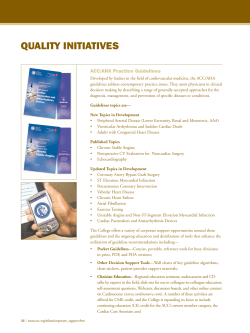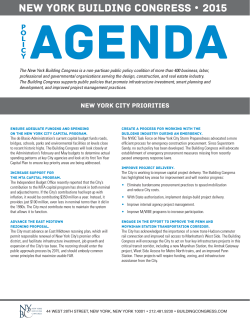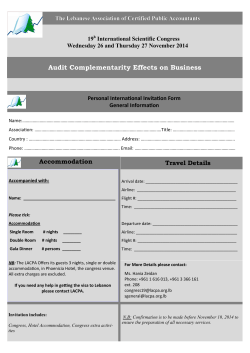
here
REFLECTIONS FROM ACC 2015 The 64th Annual scientific Sessions of the American College of Cardiology took place in San Diego in March 15 to 17. There were close to 14000 attendees from different countries. 103 physicians from Turkey attended. The congress was interactive, innovative and informative with a high scientific quality and the chosen theme for the congress was ‘more learning, less lecturing’. One day before the offical program, the 7th ACC Annual Cardiovascular Conference on the Middle East Conference took place featuring a plenary lecture by Dr. Valentin Fuster. The main focus of the conference was acute coronary syndromes and electrophysiology. Speakers from different countries in the Middle East held a joint session. In this session, Dr Alev Arat spoke abour ACS in the young. In the opening ceremony , the President of the college Dr Patrick O’Gara highlighted the innovations in Cardiology and the new things on the horizon like3-D printers, bioengineering, PCSK9 inhibitors and the big data. He also expressed concern about decreased funding and increased external regulations. He emphasised the importance of the human touch in a world of electronic health records and technology and gave examples like the fact that 47 % of the time of an emergency medicine doctor is spent in front of the computer. There were several interesting late breaking clinical trials throughout the congress with results that will have an impact on the way we practice medicine. To name a few, the PROMISE trial compared CTA to functional testing, the PEGASUS-TIMI 54 looked at prolonged dual antiplatelet therapy after myocardial infarction and the OSLER 1 and 2 studies tested a PCSK9 inhibitor showing not only LDL reduction but also improved end points. The TOTAL study suggested that routine aspiration thrombectomy is not superior to conventional PCI in patients with STEMI. During the congress, the Turkish Society of Cardiology /İstanbul Consortium Chapter held a joint session with the Indonesian Heart association on the topic of clinical pathways and outcomes in acute coronary syndromes. Dr Barış Kaya, Dr Oktay Ergene and Dr Lale Tokgözoğlu represented the Turkish Society in this session where the similarities and differences in approach between two countries and ways to improve care were discussed. At the end of this session, Dr Cihangir Kaymaz received the best abstract award for the highest ranking abstract from Turkey. His work was entitled ‘The Ekosonic endovascular system provides improvements in thrombotic burden, pulmonary arterial pressures and right atrial and ventricular functions in patients with acute pulmonary embolism at high or intermediate risk. In another debate session, Dr Bülent Görenek discussed the topic of cardioversion of atrial fibrillation with or without anticoagulation very succesfully. He emphasised the importance of individual approach for each patient. An out of the ordinary session was ‘A conversation with the legends’ where Dr Braunwald, Dr De Maria and Dr Fox discussed candidly their major successes , failures and lessons learnt in research throughout the years. On the last day of the meeting, the convocation took place. Many scientists received awards for research, education and service. It was impressive to see how many young scientists were motivated by these awards. This was followed by the announcement of the new fellows. From Turkey, Dr Aylin Yıldırır, Dr. Birhan Yılmaz and Dr Cihangir Yılmaz become fellows of the ACC. The convocation ended as Dr Kim Simmons became the new President of the ACC and gave his inagural speech. Overall, the congress was succesful in expanding knowledge and generating new insights as Dr O’Gara stated. I sincerely hope that the scientific contributions from the Turkish Cardiologists will increase even more over the years. Prof Lale Tokgozoglu MD, FACC,FESC President, Turkish Society of Cardiology
© Copyright 2025














